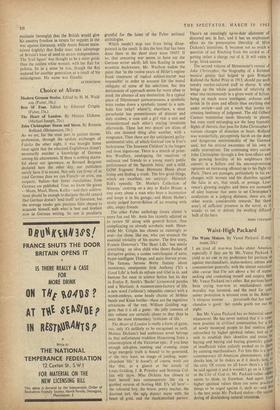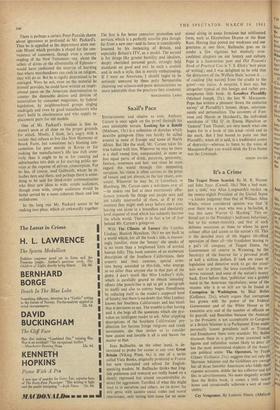Waist-High Packard
The Waste Makers. By Vance Packard. (Long- mans, 21s.)
I Am tired of woe-woe books about America, especially if they are by Mr. ,Vance Packard. I yield to no one in my preference for puritans a5 against merchandisers, status-seekers, admen and consumerism generally, with the almost unnoticc. able caveat that I'm not above a bit of status seeking and consuming myself and suspect that Mr. Vance Packard isn't either. But puritans have been crying woe-woe to mechandisers since morality was invented, and the need for con' sumer protection is stressed even in the Bible 'a virtuous woman . . . perceiveth that her mer- chandisc is good: her candle goeth not out bY night.'
But Mr. Vance Packard has no historical sense whatsoever. He has never noticed that it is cony mon practice in civilised communities for a lot of newly moneyed people to feel rootless and untouched by higher spiritual values, and so to seek to establish their identities and status IV buying and buying and buying gimmicky goOds of insufficient value unfairly pushed on to Wel by cunning merchandisers. For him this is a:jai, contemporary all-American phenomenon, and It shocks him, or he makes as if it shocks hill; 1° the core. Of course we all know there's a lo be said against it and it wouldn't go on in U WIN° j or the City of God or, Mr. Packard rather oddlY seems to think, in Erewhon. And apart frot11, higher spiritual values there are some practice.' things to be urged against it, such as--and this is the best point Mr. Packard makes--the squaP dering of diminishing natural resources. There is perhaps a certain Peter-Pannish charm about ignorance as profound as Mr. Packard's. Thus he is appalled at the department store out- side Miami which provides a chapel for the con- venience of customers, though even a cursory reading of the New Testament—say, about the sellers of doves or the silversmiths of Ephesus— would have cushioned the surprise of learning that where merchandisers can cash in on religion, they will do so. But he is rigidly determined to be outraged. Were he not, even on the material he himself provides, he could have written an inspir- ational paean on the American determination to counter the damnable desires and devices of materialism by consumer magazines, by federal legislation, by neighbourhood groups singing madrigals and even by good manufacturers who don't build in obsolescence and who supply re- placement parts for old models.
One of Mr. Packard's troubles is that he doesn't seem at all clear on the proper grounds for attack. Mostly, I think, he's angry with a society that refuses to live like New Harmony or Brook Farm, but sometimes he's blaming con- sumerism for poor morale in Korea or for making the manufacturer's life less rich creat- ively than it ought to be or for running sad suburbanites into debt or for starving public ser- vices at the expense of private consumption. For he has, of course, read Galbraith, whom he re- hashes here and there, and perhaps there is some- thing to be said for third-order communicators who filter new ideas to wide, simple audiences, though even wide, simple audiences would be better served by a more coherent thesis and less melodrama.
In the long run Mr. Packard seems to be making two pleas. which sit awkwardly together. The first is for better consumer protection and services, which is a perfectly sensible plea though far from a new one—and its force is considerably lessened by his instancing of Britain, and especially Britain's ITV, as a model. The second is for things like greater humility and idealism, deeply cherished personal goals, strongly held standards on good and evil. In such a context and in such a style, this is merely embarrassing. If I were an American, I should begin to be seriously annoyed by these petty Savonarolas churning out scissors-and-paste denunciations no more admirable than the practices they condemn.
MARGHANITA LASK I







































 Previous page
Previous page